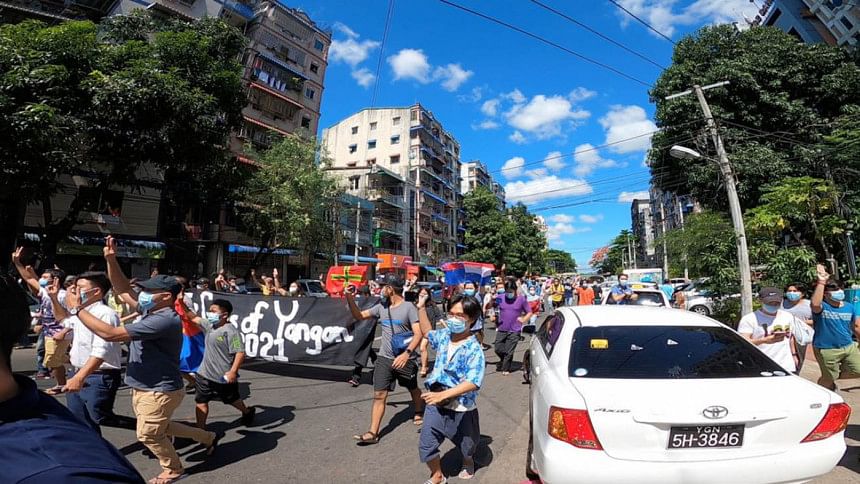Myanmar marks 100 days of junta rule with protests

Protesters rallied in towns and cities around Myanmar on Tuesday to denounce its military rulers, 100 days after the generals' overthrow of an elected government plunged the country into its biggest crisis in decades.
Demonstrators took part in marches, motorcycle convoys and flash protests to evade security forces, some making three-finger gestures of defiance as anti-coup groups renewed calls for the toppling of a junta condemned around the world for killing hundreds of civilians.
The junta has struggled to govern Myanmar since seizing power on Feb. 1, with protests, strikes and a civil disobedience campaign crippling businesses and the bureaucracy, in an overwhelming public rejection of the return of military rule.
Protesters in the biggest city Yangon carried a banner saying "Yangon strikes for complete removal of the enemy", while demonstrators in Hpakant in northern Kachin State marched chanting "the revolution must prevail".
Demonstrators in Hpakant, the Saigang region and elsewhere held signs in support of strikes and a National Unity Government (NUG), a coalition of anti-junta elements that has declared itself Myanmar's legitimate authority.
The military arrested elected leader Aung San Suu Kyi hours before a coup that it said was to protect the country's fledgling democracy after a November election whch it said was marred by fraud. Suu Kyi's party, which won in a landslide, has rejected that.
Despite the imposition of limited economic sanctions by the United States, the European Union and others, the junta has shown no sign of compromise. It has the tacit support of neighbouring China, a major investor and a permanent member of the United Nations Security Council.
Tuesday's protests took place amid sporadic violence in the country that has included fatal attacks on military-appointed administrators and a weeks of small blasts involving homemade bombs, which the junta says is the work of the ousted government.
The NUG has said the military has orchestrated much of the unrest as a pretext to intensify its crackdown.
News reporting and information flow inside Myanmar has been severely impacted since the coup, with restrictions on internet access, a ban on foreign broadcasts and some news organisations ordered to close, accused by authorities of inciting rebellion.
Security forces have killed 781 people since the coup, including 52 children, and 3,843 people are in detention, according to monitoring group the Association for Political Prisoners, whose figures are being used by the United Nations.
The U.N. human rights body on Tuesday said the military was showing no letup in its efforts to consolidate power.
In said in a statement that human rights violations went beyond the killings and included raids on homes, forced disappearances, illegal detention and the dismissal or suspension of thousands of civil servants.
"It is clear that there needs to be greater international involvement to prevent the human rights situation in Myanmar from deteriorating further," said Rupert Colville, spokesman for the U.N. High Commissioner for Human Rights.

 For all latest news, follow The Daily Star's Google News channel.
For all latest news, follow The Daily Star's Google News channel. 



Comments